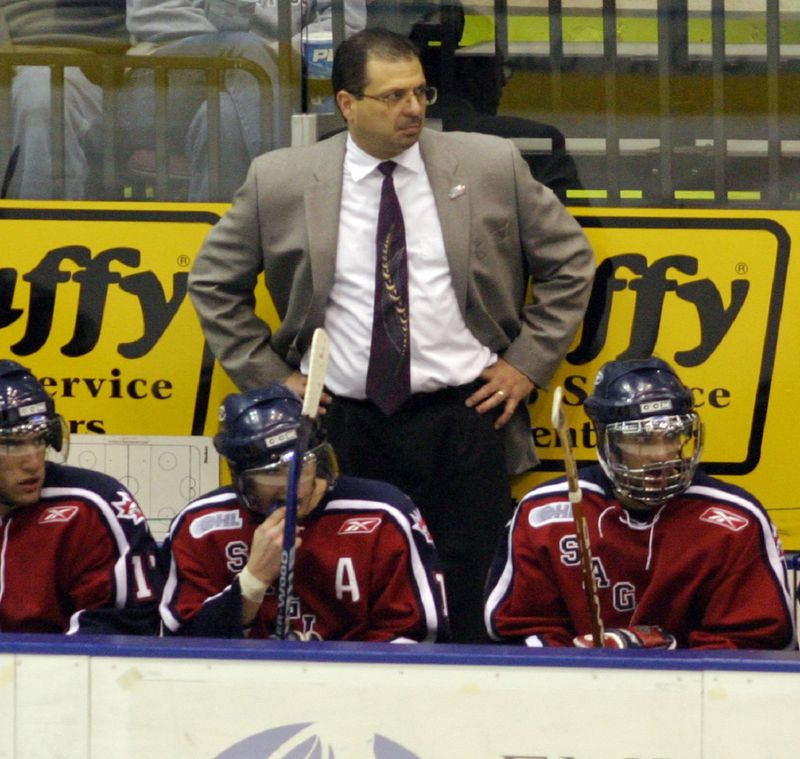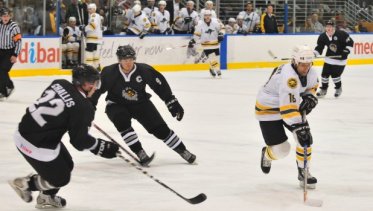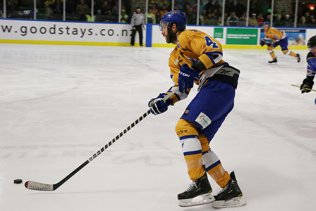USA HOCKEY: BOB MANCINI
“Youth sport should be a safe haven for kids to learn and grow both mentally and physically”
The NZIHF’s annual Labour Weekend Development Camp sees people from across the country coming together as players and coaches to help with the development of hockey across the spectrum. This year, those who have applied for the camp as either a coach or player are fortunate to learn from key individuals from USA Hockey, like Bob Mancini, assistant executive director of hockey development for USA Hockey. With over 35 years of experience in the game, Bob is a scholar in the world of hockey who brings much to the table in terms of the development of youth.
Bob first became involved in hockey at about the age of four, his father took him to watch a local minor league team called the Long Island Ducks play. Bob remembers “This was back when boards were lower than now and before plexiglass, we were sitting along the sideboards in the first row and during a warmup, a player skated to the boards and stopped and sprayed snow all over me. My dad says that my eyes got really wide and I was hooked ever since.” Bob first started skating at the age of seven or eight years old, and describes that he first started recreational hockey because he “bugged his parents enough”. Bob’s parents first took him and his sister to skate at the local pond, then later took them to free skate at the local community rink. Bob continued playing hockey in his later life, where he played NCAA Division 1 hockey at Colorado College and played a year of professional hockey in Italy before he began coaching. Bob wasn’t the only one in his family who showed interest in the game. His father played street hockey in Brooklyn and his younger sister played hockey for a little while, but Bob discloses, “There wasn’t really any opportunity for girls to play hockey in the 70s in New York.” Bob believes that his fondest memories of playing hockey were his teammates, the tournaments and the post-game get-togethers at parent’s houses. “Once my Pee Wee team stayed in a round hotel in Syracuse (New York) for a tournament where we played ‘knee hockey’ in the round. The goalies were positioned back-to-back, the game was continuous and sometimes you could only hear what was going on.” What Bob loved the most about playing was “the times we were able to get on the ice and just play, no coaches, no organized games, no referees, just a few friends and me on the ice having fun.”
As a kid living in New York with the New York Rangers as the sole team for New York, and whose father would support, Bob believes that “It was only natural for me to be a fan of the Rangers.” Bob’s favourite players were Rod Gilbert, Vic Hadfield and Jean Ratelle, who were a power trio who played on the same line for the Rangers. In 1972 the New York Islanders became an NHL expansion team and were just eight miles from where Bob lived, meaning that it was easy to get tickets and become a fan. Bob explains “It was incredible to be a fan during the time they won four Stanley Cups in a row, and I got to see some great teams with some great NHL players: Bryn Trottier, Bobby Nystrom and Mike Bossy.” Though Bob has been an Islander fan since they first formed, he has switched back to supporting the Rangers following the news of his son being drafted by them. “It’s funny how life comes full circle”, says Bob.

Bob has acted as both an assistant and head coach at the NCAA Division 1 College level. He has also coached Major Junior in the Ontario Hockey League and has coached many teams at the international level. Bob also acted as the Player Development Coach for the Edmonton Oilers. Bob first began coaching because of his junior coach, Lou Vairo. Lou Vairo is a world-renowned coach and coach educator who went on to coach the USA’s 1984 Olympic team and was inducted into the U.S Hockey Hall of Fame. Bob describes Lou Vairo as “A passionate, fair, tough, and demanding coach all at the same time. My teammates and I couldn’t wait to get to the rink every single day because he made the game fun.” Lou Vairo became Bob’s mentor, and this season will be Bob’s 40th season since he quit playing competitively.
Bob’s journey with USA Hockey started with his good friend, Ken Martel, who is USA Hockey’s Technical Director for the American Development Model. The American Developmental Model is an athlete-centred, coach-enhanced, administrator-supported framework that aims to help all individuals realize their athletic potential and utilize sport as a path toward an active and healthy lifestyle. Ken shared the plans that USA Hockey had to start up a new program, and asked if Bob would be interested in returning to USA Hockey. “Initially I said no as I was working in the National Hockey League at the time and was enjoying my position with the Edmonton Oilers,” Ken asked to send through information to Bob about the ADM as Bob’s 6-year-old son had started playing hockey, and Ken wanted Bob’s opinion on the framework. “Looking back, I think he was just setting the bait and I was quickly reeled in.” Bob has been back with USA Hockey ever since.
Bob’s initial role with USA Hockey was Regional Manager of the American Development Model in Michigan, Missouri and Illinois. His role alongside six other ADM managers was to manage the rollout and implementation of a better player development model across the USA. Each manager was in charge of delivering and facilitating change in both their given region and nationally. Bob explains that the ADM was created because of “A two-fold reason. USA Hockey membership was in a decline at the youth level and we had no National Plan for Development of our grassroots youth players.”
Since the implantation of the ADM, USA Hockey has seen an increase in overall registration by making the game fun and age-appropriate for various age groups. Bob reveals that aside from the COVID-affected period, USA Hockey has surpassed 100,000 players at the Under 8 level since 2009, and has increased the percentages of American players at the highest levels of women’s hockey; junior hockey; and college hockey. They have also seen an increase in their portion of NHL players from 21.9% before the ADM to 27.2% in 2022.
Though USA Hockey has made great progress since the ADM was implemented, there are still challenges facing youth sports in North America. Bob explains “Cost is always a huge challenge, and we must find ways to make youth sports accessible to all. The biggest challenge we face is how do we give youth sports back to our youth!”
As mentioned earlier, Bob is one of three coaches who will be attending this year’s Labour Weekend Development Camp. When asked what they are hoping to achieve while he is down here, Bob answered “Professionally, we want to help in any way we can. Sharing of ideas and knowledge, being some of our experience to players, coaches and administrators about the mistakes we have made and what we have learned from them.” The focus is on individual player development, however to better player development he believes that the development of coaches is key. “We are all in the game to make it better and to make a change at a global level. At any time I have been involved in an exchange such as this, it has benefited all involved.” Bob is also hoping to learn about New Zealand’s hockey, culture and country while he is here.
What Bob loves most about ice hockey is that “There is a beauty to the game that I have always admired. Hockey has always been fun, the friendships you make, the camaraderie you have with teammates, and the commitment you must have to be successful.” It is fair to say that Bob has had a successful career in hockey. Bob identifies his biggest achievement in hockey is that “All the players I have coached love the game and are still involved in the game. Many have gone on to play at the highest levels, some are professionals in other walks of life such as becoming doctors, lawyers, and business owners. It is an army of former players and coaches who are as passionate about hockey as I am.” When asked what hockey has given him, Bob says “A wonderful life of travel, friends and relationships. A career filled with the magnificent ups and downs associated with the sport. Just trying to answer this question brings a smile to my face.”
For the future of USA Hockey, Bob hopes to see some more focus on what is essential for kids. “USA Hockey has been a leader in youth sports in the United States, and I look for us to continue to help change the youth sports culture and environment so that we give youth sports back to youth.” Bob believes that “Youth sports should not be entertainment for adults, nor should it be an industry where making money is valued more than doing what is right for kids. Youth sport should be a safe haven for kids to learn and grow both mentally and physically.”
Bob offers advice to players and coaches alike. For coaches, “Be a lifelong learner, find a mentor, don’t just blindly accept current norms but ask questions that challenge the environment and be strong in your convictions.” For players, Bob thinks that the game has to be fun, “You have to be passionate about the game and as you get older you have to take responsibility for your own development.” Bob also has some advice for parents and says “Make it fun for your child, help grow their passion, find a program that is age appropriate and be patient.”
Registrations are still open for the development camp, and it is highly recommended for those interested to sign up for this fantastic opportunity to learn from some of the most knowledgeable hockey professionals in the world.
You can find out more info on the NZIHF Camps here below:
https://www.nzicehockey.co.nz/2022-youth-development-camp-registrations-open/




